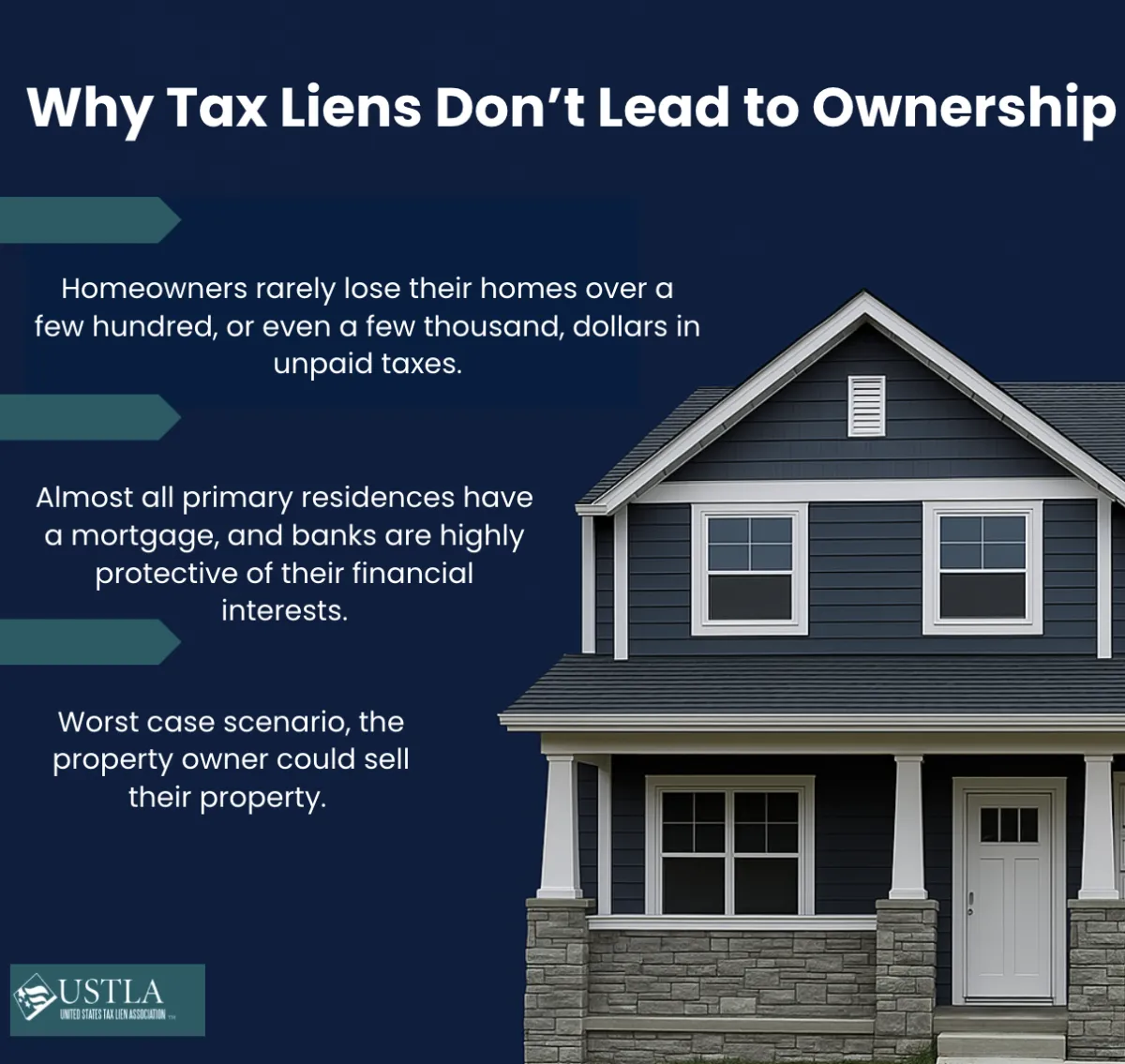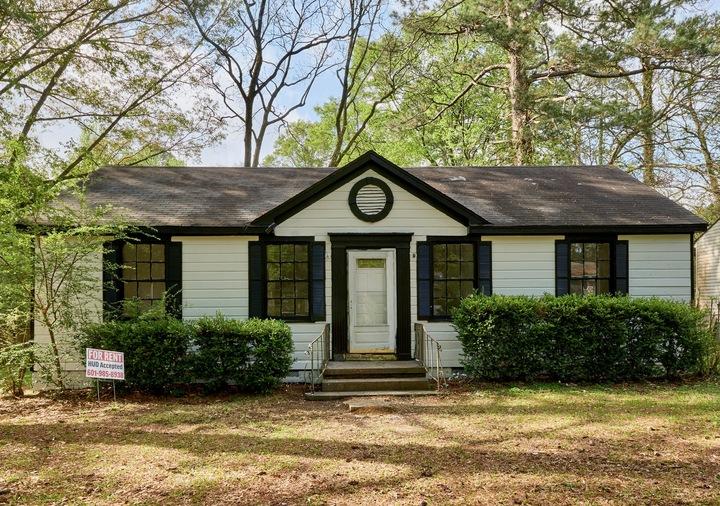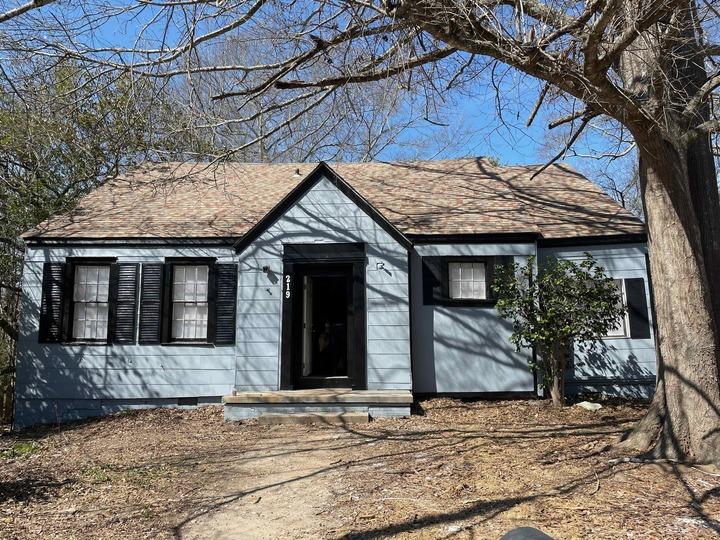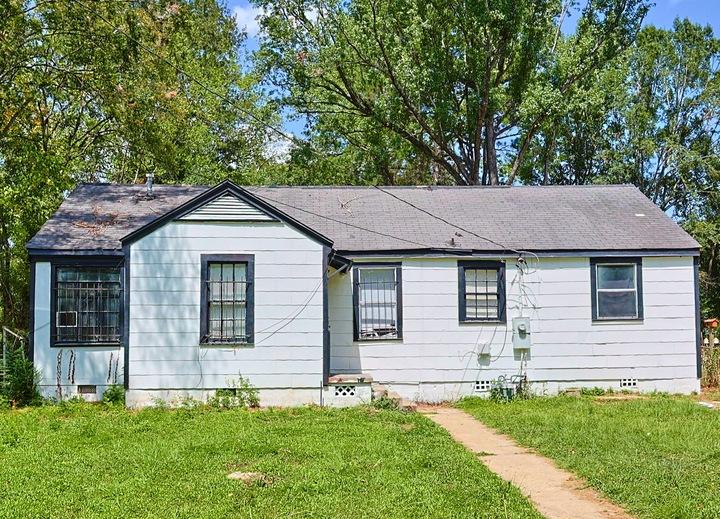Why Most People Never Acquire Properties Through “Tax Lien Certificates”
Key Takeaways
A common misconception in real estate circles and online investment communities is that tax lien certificates are a shortcut to acquiring properties at steep discounts.
They’re not.
Many investors dream of scooping up real estate for pennies on the dollar, and tax liens seem like the golden ticket. But here's the truth: over 99% of tax liens, invested in properly, result in principal plus interest, not property acquisition; and that's not a failure. Because, contrary to popular belief, tax lien investing is not a real estate acquisition strategy.
It's crucial to understand that simply holding a tax lien certificate does not mean you’ll acquire the property. In fact, property acquisition through tax lien investing happens only through specific, targeted strategies, not by default. Informed investors understand that tax lien investing is not a path to property ownership.
Below, we’ll explore exactly why this is and how you can use this truth as a strategy for your investing.
If you’re new to tax lien investing or you’re looking to brush up on the basics, this one’s for you.

Why Tax Lien Investments Don’t Lead to Property Ownership
There are three key reasons why most properties, especially primary residences, don’t end up in the hands of lien holders:
#1: Homeowners rarely lose their homes over a few hundred, or even a few thousand, dollars in unpaid taxes. Think about it: no one is going to walk away from their home for an amount that small, especially when state laws provide a lengthy redemption period to catch up on payments, typically 2 to 4 years.
#2: Almost all primary residences have a mortgage, and banks are highly protective of their financial interests. The mortgage lender is notified if a homeowner falls behind on property taxes and a tax lien is issued. Banks will not risk losing their position on the property; they will step in and pay the delinquent taxes to safeguard their investment.
#3: Worst case scenario, the property owner could sell their property. If homeowners can’t come up with the funds to pay their delinquent taxes, they still have a practical option: selling the property. This allows them to pay off the tax debt and retain the remaining equity. Property owners, especially those with mortgages, have a strong incentive to protect that equity, and with redemption periods typically lasting years, they’re given ample time to do so.
Why Tax Liens Are Not A Get-Rich-Quick Scheme
Understanding these dynamics is crucial to understanding why tax lien investing is designed to yield secure interest returns, rather than acquiring real estate by chance.
Some investors come into tax lien investing thinking it’s a get-rich-quick scheme because many outside sources fabricate the truth about acquiring property from tax lien certificates at very low prices.
However, in over 99% of residential cases, you will not end up with the property. Homeowners are granted a redemption period, from 6 months to 3 years on average, which gives them ample time to repay their delinquent taxes. And in most cases, they do so.
Even in the rare case that a property does not redeem, an attorney must be hired and the property must be taken through legal property tax foreclosure, which can take several months. The property owner and the bank can still redeem during the foreclosure process.
Tax lien investing is a slow and steady financial strategy designed to earn secured interest, rather than acquiring real estate quickly.
Consider this: if your goal is to acquire property, investing in a tax lien certificate and then waiting several years, hoping a property owner does not pay, makes little sense. Simply put, tax lien certificate investing is not a property acquisition strategy; it’s a proven interest-earning investment vehicle.
At U.S. Tax Lien Association, we educate people on the realities of tax lien investing and provide tailored strategies to match their financial goals because we believe every investor deserves to know the truth and make informed decisions.

The Goal Of Tax Lien Certificates
Unlike traditional real estate strategies centered around buying, flipping, or renting properties, tax lien investing is not about acquiring real estate. Its primary goal is to safely earn fixed, secured interest, making it a financial strategy rather than a property acquisition method.
What makes tax lien certificates particularly attractive is their stability. They are considered one of the most recession-resistant investment vehicles available because they are not tied to market volatility.
For example, if you acquire an Iowa tax lien certificate at 24% interest, regardless of what happens in the market or economy, you’re locked in at 24%. If the stock market crashes, your tax lien certificate still pays you 24%. If the real estate market crashes, your tax lien still pays you 24%. If we fall into a recession, your tax lien still pays you 24%. If a worldwide pandemic hits, your tax lien certificate still pays you 24%.
That’s because tax lien investing isn’t about property speculation; it’s about stability and impact. This investment model provides critical funding to local governments while offering investors a predictable and secure return with minimal risk.
It’s a rare win-win-win scenario: property owners win because they gain extra time to repay their taxes, counties win by receiving essential funding for public services, and investors win by earning strong, secure returns.
As you can see, tax lien investing strategies are not designed for people looking to own real estate; they are intended to earn fixed, secured interest rates. States set these interest rates, ranging from 8% to 24% annually, depending on where you invest. Tax lien certificates are intended to be a safe, recession-resistant investment vehicle, not a direct path to property ownership.
Understanding The Redemption Timeline
So, why is property ownership so rare in tax lien investing, and why is that actually a good thing for investors? Let’s break it down.
At the U.S. Tax Lien Association, we've been investing in tax lien certificates and tax deed properties for over 30 years, and we can confidently say that homeowners almost never lose their homes over a few thousand dollars in back property taxes. It's not only rare, but also highly unlikely.
The vast majority of homeowners do pay their delinquent property taxes, especially since they typically have a redemption period lasting multiple years to bring their accounts up to date. Across much of the United States, redemption periods range from 2 to 4 years, allowing property owners to remain in good standing for an extended period before foreclosure becomes an option.
Here’s how that timeline usually plays out:
After 1 year of unpaid taxes, a lien is placed on the property.
Approximately 30 days later, the county holds a tax lien certificate auction.
Once you acquire the lien, the redemption period begins, usually lasting around 3 years. During this time, the homeowner has the opportunity to repay the back taxes along with the interest you’re owed.
If the taxes still aren’t paid, you may begin the foreclosure process, which can take several additional months.
In the best-case scenario, as an investor, you’re looking at a 4 year or longer timeline before potentially acquiring the property. And during all that time, you're essentially on standby, hoping the property owner doesn’t pay.
Most homes also have a mortgage, and if a tax lien foreclosure is initiated, all other lien-holders, including banks, must be notified that they risk losing their position on the property. It’s highly unlikely a bank will lose its position and allow that to happen. To protect their financial interest, they almost always step in and pay the back taxes. That means the mortgage is preserved, the homeowner remains in the home, and the tax lien investor receives payment with interest.
In over 99% of cases involving primary residences, the property owner, or their bank, redeems the lien. This ultimately means: you are not getting the property.

Benefits of Investing in Tax Lien Certificates
One of the most overlooked advantages of tax lien investing is that it provides a smart entry point for those who are not yet ready to own physical real estate. It allows you to get your feet wet in the real estate world without the responsibilities and pressures of property ownership.
Tax lien certificates are also among the most stable and recession-resistant investments available. They’re backed by local government property taxes, not market speculation, making them a low-risk option even during economic downturns.
And perhaps best of all, you can start small. With lien prices starting at just a few hundred dollars, beginners can learn the process, gain experience, and build confidence before scaling their investment portfolio.
Want to Acquire Valuable Real Estate at Deep Discounts?
To actually acquire property at deep discounts, USTLA teaches a different approach; our proprietary Tax Deed "Get the Property Every Time" strategies. These systems target specific types of properties, mostly non-homesteads, and use county-held, or over-the-counter, tax deed processes that do not require waiting through lengthy redemption periods.
Unlike traditional methods, we acquire these properties directly from the county, without competing at auctions, and take immediate possession for only the price of the back taxes.
This is where real estate acquisition occurs, not through passive waiting, but through strategic research, precise targeting, and timely execution.
Here are three case studies from our clients who acquired these properties outright at deeply discounted prices:
#1 187 Treehaven; Acquisition Price: $5,440

#2 219 Beverly; Acquisition Price: $5,316

#3 264 Sewanee; Acquisition Price: $8,640

Now that you have a clearer picture of how tax liens function and why they rarely result in property ownership, you’re in a better position to decide if this strategy aligns with your financial goals. As you move forward, it's essential to understand the specific laws, rules, and procedures in the state where you plan to invest.
If your ultimate aim is to acquire real estate at massive discounts, exploring USTLA's proprietary "Get the Property" strategies will be far more effective. We offer a free course to help you get started on your journey into investing.
Whether your focus is steady returns or acquiring property, success starts with the proper education and a well-informed plan. Enroll in USTLA's Free 3-Module Online Tax Lien Investing Crash Course; designed to give you a step-by-step roadmap from fixed returns to property acquisition strategies.
USTLA's FREE Comprehensive
3-Module Tax Lien Investment
Online Crash Crouse
The ultimate beginner's guide to successful tax lien
certificate & tax deed investing.
Start Learning from the Comfort of Your Home Today
Featured Lessons
Vital Information Beginner’s MUST KNOW FIRST so you can Get Started Right

Lesson #1
What is Tax Lien Investing & How Can it Help You Achieve Financial Freedom

Lesson #2
How to Acquire Properties for the Back Taxes & Penalties Only

Lesson #3
How Much Investment Capital is Needed to Get Started?
As with all investments, there is always an element of risk. Even if the interest rates are written into state government law, mandated by state government law, and are regulated by state government law, there is a chance of you losing part or all of your investment. You must always try to get the best education and practice safe investing, no matter which investment vehicle you choose.

